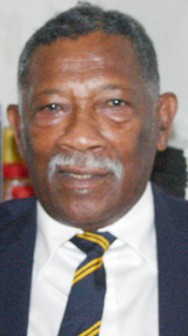Many in the cricketing world will be surprised to learn that Basil Butcher was the first person of Amerindian descent to represent the West Indies in the English ball game of cricket.
His grandmother was a “full out” Amerindian and for Basil Fitzgerald Butcher, what or who she was hardly mattered except for the fact that she had produced a grandson who represented Guyana and the West Indies in the discipline of cricket.
Butcher fought his way to Test level at a time when so many had been knocking at the door of West Indies cricket and failing.
He had made his mark in the County games when Berbice matched strength with Essequibo and Demerara.
Now, the selectors were all eyes as they watched the young man from Port Mourant, who was carrying on in the shadows of John Trim and Robert Christiani.
Against a Jamaica 11 he won the BG’s selector’s nod and bravely walked to the middle.
He did fairly well amidst the testing climate of his debut game and his first innings score of 64 remained one of class and style.
He also performed well in the second innings even though he only made 32. This was in 1954.
It was no surprise then when, along with Joe Solomon, Rohan Kanhai, Lance Gibbs, Bruce Pairaudeau, Clyde Walcott, Clifford McWatt, Pat Legall and others, he won the selectors’ nod and played in the Quadrangular Tournament for Guyana.
Surely, it was for the Jamaican bowlers, a baptism of leather hunting. At that time the Jamaican team featured Roy Gilchrist, Tom Dewdney, Alfred Valentine, Allan Rae, Colly Smith and A.P. Binns among others.

The three-day leather hunting that Allan Rae and his boys faced is now history. Pairaudeau had chalked up 111 and Kanhai had made 129.
Bucher decided not to be outdone and his unbeaten 154 still stands out in the memory while Solomon, naturally, chipped in with an unbeaten 114. Skipper Clyde Walcott was able to declare the innings closed at 601 for 5. Of course against Barbados, Butcher could only muster four runs before he went by the LBW route.
It took some fighting in the newspaper to convince the powers that be for Butcher to eventually get the call to Trinidad where the West Indies Board organized a trial match – the basis of which the team was selected to tour England in 1957. Butcher did not get the ticket for England for that game though many still held the view that he drove like Everton Weekes. He had to await the retirement of Weekes and Walcott however, before he made the team called the West Indians.
Of course Butcher played for the West Indies during the tour of India and Pakistan when he chalked up his first Test hundred and featured in a 200-run partnership with Kanhai. He did play at home against the MCC and perhaps he is still puzzled by the instructions by skipper Gerry Alexander to attack the bowling when it was clear to all and sundry that no result was possible in that game apart from a draw.
Come 1963, however, Butcher was in the team to England. It was no surprise to those who knew why Worrell caused Butcher to go up in the batting order. It was Worrell’s way of clearing the air and dealing with critics that Butcher was unable to play the faster bowlers and that he, Butcher, was quite capable to deal with the ball, even when it was new. The 133 not out in the Lord’s Test performed by Butcher probably tells the story to us all.
One could not forget either the 1966 tour. Could anyone forget the precarious position that the West Indies was in with 65 more runs required to overcome the English first innings score against the West Indies and Butcher’s 209 not out and the West Indies eventual victory?
A further look into Butcher’s past will also tell the story of how well he performed right here in the Caribbean. Suffice it to say that from 1954 to 1972, he has amassed 11,628 runs at an average of 49.99 and this includes 31 centuries while capturing 40 wickets. For the West Indies he recorded 44 Test centuries recording 3,104 runs at an average of 43.11 with 209 not out being his highest score.
To crown it all he made 99 in his last Test innings and was given out caught behind. To this day, Basil will say, “I was out. The umpire said so.” Those close enough to the dressing room recall the apologies that poured out to Butcher after that decision. England had just started showing television in colour. Clearly, the ball had touched his white shirt sleeve and not his bat when he was given out. But, Butcher the man, habitually walks immediately when an umpire raises hand, and it is no wonder he insists, “I was out. The umpire said so.”




